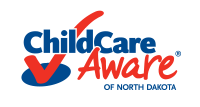Child Care Licensing
Child care licensing is a form of consumer protection that reduces the risk that children are being cared for in an unsafe environment. North Dakota state laws, and local ordinances in some locations, regulate child care licensing.
View our Start Child Care Guides for detailed information about becoming a licensed child care provider.
Have a Question?
Contact a Child Care Aware® Start-Up Consultant
800-997-8515 StartChildCare@ndchildcare.org
-
Who Issues a Child Care License?
A child care license is issued by the state. A licensing specialist performs the licensing study.
Find the contact for your county ➜
Licensed providers are required to display their current license, allowing parents to verify that a program has completed the licensing process and holds a current license. -
Licensing also determines how many children can be cared for by a family/group provider or child care center. Adult-to-child ratios, total square footage, ages of the children and group size are all considered.
Child Care License Types
North Dakota Century Code outlines the basic laws and regulations regarding child care facilities and licensing. There are also additional guidelines for specific child care license types.
| Family License | Cares for 7 or fewer children in the provider's own home. Family providers are required to include their own children under age 12 in the adult-to-child ratio. | Family Regulations |
| Group License | Cares for up to 30 children in their home or a public/private building. Maximum group size may be restricted based on square footage of facility, adult-to-child ratios or local ordinances. | Group Regulations |
| Center License | Cares for 19 or more children in a public/private building. The total number of children who can attend at any given time is based on square footage of facility and adult-to-child ratios. | Center Regulations |
| Preschool | Provides education and social experiences for children ages 2 to 5. A child's attendance is limited to 3 hours per day. | Preschool Regulations |
| School Age | Cares for school-age children before and after school, during school holidays and summer vacation | School Age Regulations |
Accredited Programs
Some programs strive to go beyond minimum standards and make their program the best it can be by becoming accredited. This process, established on a national level, requires the completion of a self-assessment process, documentation of their program practices, and a day-long observation by a nationally trained observer. Independent accreditation organizations include:
- National Association for the Education of Young Children (NAEYC)
- National After School Association (NAAWEB)
- National Association for Family Child Care (NAFCC)
Unlicensed Care
North Dakota law states that a child care provider must be licensed if they care for more than 3 infants (0-2 years) or 5 children (0-12 years). The provider must count their own children who are under 12 years of age in this total. Anyone caring for more than three infants or six or more children without a license is operating against North Dakota state law. Unlicensed care is legal in two provider categories:
SELF-DECLARED PROVIDERS
- Can care for five or fewer children
- Sign a document promising to follow limited rules, but are not checked for compliance
- Agree to background checks on abuse and neglect
- Can enroll children whose care is subsidized by federal financial assistance
- Are not inspected by HHS Early Childhood Licensing Unit, unless a complaint has been issued
UN-LICENSED PROVIDERS
- Can care for five or fewer children
- Have no obligation to follow state child care licensing rules
- HHS Early Childhood Licensing Unit does not inspect the facility or investigate complaints

